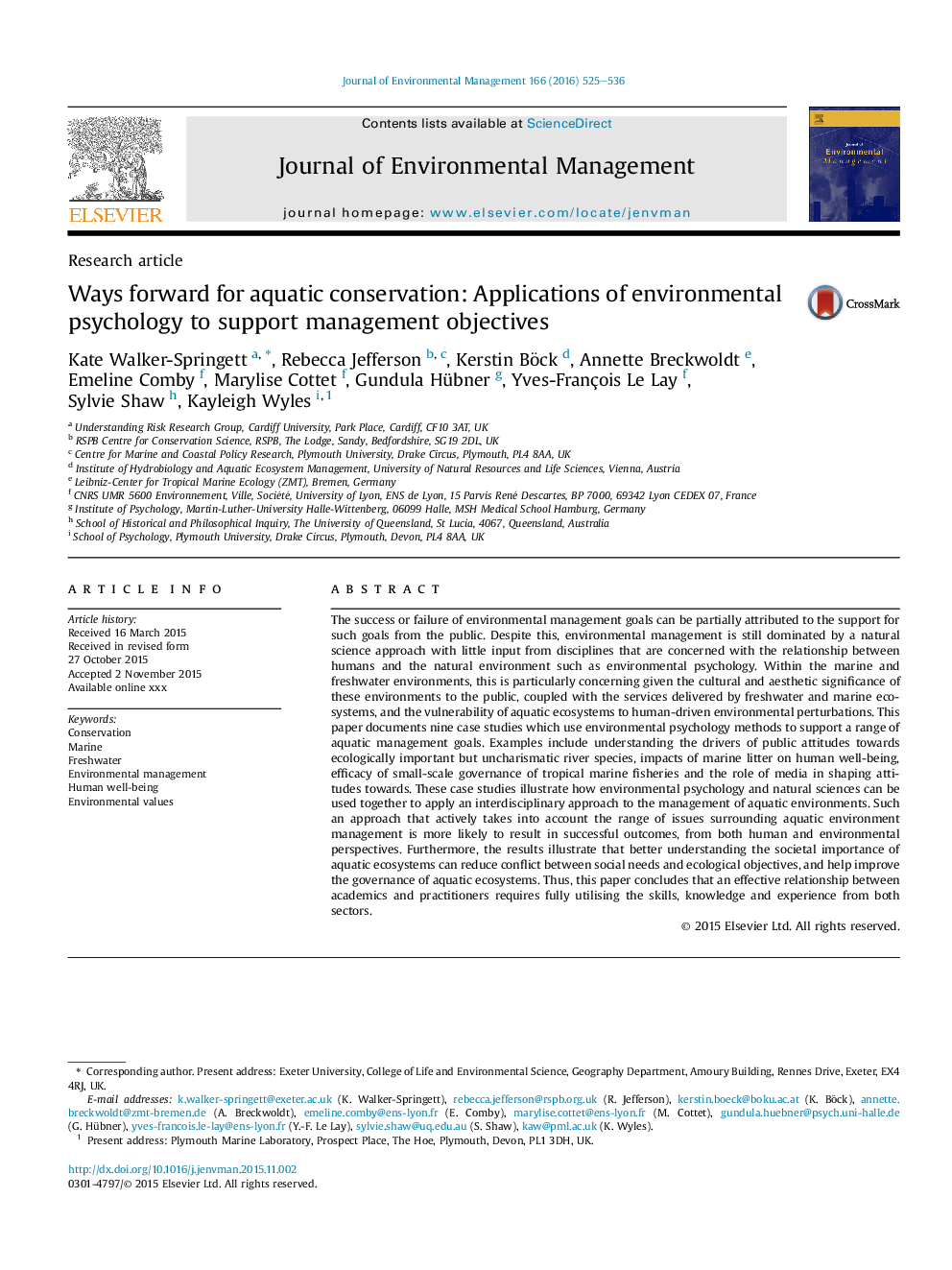| کد مقاله | کد نشریه | سال انتشار | مقاله انگلیسی | نسخه تمام متن |
|---|---|---|---|---|
| 7481409 | 1485246 | 2016 | 12 صفحه PDF | دانلود رایگان |
عنوان انگلیسی مقاله ISI
Ways forward for aquatic conservation: Applications of environmental psychology to support management objectives
ترجمه فارسی عنوان
راه های جلوگیری از حفاظت آبزیان: کاربرد روانشناسی محیطی برای حمایت از اهداف مدیریت
دانلود مقاله + سفارش ترجمه
دانلود مقاله ISI انگلیسی
رایگان برای ایرانیان
کلمات کلیدی
حفاظت، دریایی، آب شیرین، مدیریت زیست محیطی، رفاه بشری، ارزش های محیطی،
ترجمه چکیده
موفقیت یا شکست اهداف مدیریت زیست محیطی می تواند تا حدی به حمایت از چنین اهدافی از سوی مردم منجر شود. با وجود این، مدیریت زیستمحیطی هنوز با رویکرد علمی طبقاتی همراه است که در آن از رشته هایی که ارتباط بین انسان و محیط طبیعی مانند روانشناسی محیط زیست دارند، از اندیشه های کمتری برخوردار است. در محیط های دریایی و آب شیرین، این به ویژه مربوط به اهمیت فرهنگی و زیبایی شناختی این محیط ها به مردم است، همراه با خدمات ارائه شده توسط اکوسیستم های آب شیرین و دریایی و آسیب پذیری اکوسیستم های آبزی به منازعات محیط زیست منجر شده است. این مقاله 9 مورد مطالعات موردی را که از روش های روانشناسی محیطی برای حمایت از تعدادی از اهداف مدیریت آبزی استفاده می کند، نشان می دهد. نمونه هایی از جمله شناخت رانندگان نگرش عمومی نسبت به گونه های مهم اقلیمی مهم اما غیرقرصنده رودخانه، تأثیر بسترهای دریایی بر رفاه بشری، اثربخشی حکومت در مقیاس کوچک شیلات گرمسیری و نقش رسانه در شکل دادن نگرش نسبت به آن است. این مطالعات موردی نشان می دهد که چگونه روانشناسی محیط زیست و علوم طبیعی را می توان با هم برای استفاده از یک رویکرد بین رشته ای به مدیریت محیط زیست آبزیان استفاده کرد. چنین رویکردی که به طور فعال با توجه به طیف وسیعی از مسائل مربوط به مدیریت محیط زیست آبزی، احتمالا منجر به نتایج موفقیت آمیز از دیدگاه انسان و محیط زیست می شود. علاوه بر این، نتایج نشان می دهد که درک بهتر اهمیت اجتماعی اکوسیستم های آبزی می تواند مناقشه بین نیازهای اجتماعی و اهداف زیست محیطی را کاهش دهد و به بهبود مدیریت اکوسیستم های آبزی کمک کند. بنابراین، این مقاله نتیجه گیری می کند که یک رابطه موثر بین دانشگاهیان و متخصصان نیاز به استفاده کامل از مهارت ها، دانش و تجربه از هر دو بخش دارد.
موضوعات مرتبط
مهندسی و علوم پایه
مهندسی انرژی
انرژی های تجدید پذیر، توسعه پایدار و محیط زیست
چکیده انگلیسی
The success or failure of environmental management goals can be partially attributed to the support for such goals from the public. Despite this, environmental management is still dominated by a natural science approach with little input from disciplines that are concerned with the relationship between humans and the natural environment such as environmental psychology. Within the marine and freshwater environments, this is particularly concerning given the cultural and aesthetic significance of these environments to the public, coupled with the services delivered by freshwater and marine ecosystems, and the vulnerability of aquatic ecosystems to human-driven environmental perturbations. This paper documents nine case studies which use environmental psychology methods to support a range of aquatic management goals. Examples include understanding the drivers of public attitudes towards ecologically important but uncharismatic river species, impacts of marine litter on human well-being, efficacy of small-scale governance of tropical marine fisheries and the role of media in shaping attitudes towards. These case studies illustrate how environmental psychology and natural sciences can be used together to apply an interdisciplinary approach to the management of aquatic environments. Such an approach that actively takes into account the range of issues surrounding aquatic environment management is more likely to result in successful outcomes, from both human and environmental perspectives. Furthermore, the results illustrate that better understanding the societal importance of aquatic ecosystems can reduce conflict between social needs and ecological objectives, and help improve the governance of aquatic ecosystems. Thus, this paper concludes that an effective relationship between academics and practitioners requires fully utilising the skills, knowledge and experience from both sectors.
ناشر
Database: Elsevier - ScienceDirect (ساینس دایرکت)
Journal: Journal of Environmental Management - Volume 166, 15 January 2016, Pages 525-536
Journal: Journal of Environmental Management - Volume 166, 15 January 2016, Pages 525-536
نویسندگان
Kate Walker-Springett, Rebecca Jefferson, Kerstin Böck, Annette Breckwoldt, Emeline Comby, Marylise Cottet, Gundula Hübner, Yves-François Le Lay, Sylvie Shaw, Kayleigh Wyles,
